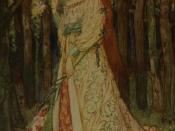Amongst the three love poems examined in this essay, the theme of male or female power in relationships pervades throughout. The views of the speakers are expressed and defined through literary and poetic techniques. This gives the reader an insight into the speaker's problems and dissatisfaction of a relationship, due to an imbalance of power. However there are dissimilarities between the poems - for example where in "La Belle Dame Sans Merci" the female displays supernatural power and dominance over a knight, the Duke in "My Last Duchess" desires psychological power over his Duchess
The poem "My Last Duchess" is a dramatic monologue written by Robert Browning, coming from the Duke of Ferrara. In the poem he displays his megalomaniac tendencies towards his late wife and how he feels his title symbolises his power over her. We also learn how he doesn't want his wife for love but to be able to exhibit her and 'show her off' and enforce psychological power over.
The Duke calls her "My Last Duchess"; here the use of the possessive pronoun indicates to the reader how he feels his wife belongs to him. This implies that the Duke has an authoritative and almost overbearing character as he thinks of his wife more as an object, which he owns rather than a person. The Duke proves his power even further by saying "Notice Neptune, though, / Taming a sea horse". Here he relates himself to Neptune, the god of the seas showing how he believes himself to be god-like. Also the Duke believes himself to be above the level of common people saying he would never "stoop" down to their level. From this we can presume the Duke is afraid of losing his power, and would rather hold...


